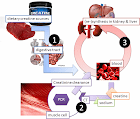Now that Jose Antonio and Victoria Ciccone (the first of whom many will probably know from his old radio show on BB.com, the countless articles he wrote, his job as an editor or whatever else), published a paper in the Journal of the International Society of Sports Nutrition, it appears my new answer to the said question would be: "It looks like it's better to take your creatine after a workout." My previous suggestion to take 50% before and 50% after, on the other hand, has not yet been falsified. So maybe I will have to go back on the revised advice again and re-revise it, so to say. And you know what? That's not a problem! That's science. Any "truth" in science is only true until it has been falsified and I do already have my doubts about the universality of this new "truth" about creatine (see bottom line).
So, if after is the way to go? How do we know?
What Antonio and Ciccone did was to recruit 19 male recreational bodybuilders (mean ± SD: age, 23.1 ±2.9 years; height, 166.0 ± 23.2 cm; body weight, 80.2 ± 10.4 kg) with training experience of >1 year who were obliged to stop taking any form of workout supplement or dietary aid at least 4 weeks before the study began.
All subjects participated in the same standardized periodized, split-routine bodybuilding training regimen that was "geared primarily for skeletal muscle hypertrophy" (Antonio. 2013)."Subjects were randomly assigned to one of two groups: a PRE-SUPP or POST-SUPP group. The PRE-SUPP group consumed 5 grams of creatine monohydrate immediately prior to training. The POST-SUPP group consumed the same amount of creatine immediately after training. Following pre-testing data collection, participants began a periodized four-week resistance training program that was self-administered. On off-training days, subjects consumed creatine at their convenience. The total treatment duration was four weeks." (Antonio. 2013)
The Pharmacokinetics of creatine Part I& Part II
- training frequency: 5x per week
- total number training sessions: 20
- training duration: ~ 60 min per session
 |
| Figure 1: Outline of the training schedule; created based on the description on the original study (Antonio. 2013) |
That's the study you've been waiting for, right?
With experienced trainees, the requirements of not ingesting any other supplements (including amino acids) that would probably thwart the results, standardized strength tests, as well as random 24h dietary recalls every week, obligatory training logs and BodPod body fat measurements, this is the kind of study of which I would love to see at least once a week - not every 6 months.
 |
| Figure 2: Changes in body composition and 1-RM bench press strength, left; nutrient composition in grams/day, right (Antonio. 2013) |
In the bodybuilders in the study at hand only the changes in fat free mass and the bench press power did reach statistical significance and the superiority of the post-workout supplementation is "possible" and "likely", but by no means certain. Still, Antonio and Ciccone feel that
Moreover, they point out that "of the 19 subjects that completed the study, 16-21% were non-responders regarding muscular strength and FFM." That's irrespective of the nutrient intake, by the was which was similar between the groups and had with 1.9g of protein per kg body weight per day more than enough protein to support muscle growth."[t]he use of recreational bodybuilders in the current investigation is advantageous because it is difficult for highly trained individuals to experience an increase in FFM or muscular strength in the time frame allotted for this study." (Antonio. 2013)
Additional tip: Supercharge creatine with baking soda (learn more)
So is it effective or not?
 |
| For an optimal ratio of lean to fat mass loss on a diet it takes "only" twice the RDA of protein. |
How's that? Well, not only as a result from the minimal amount of creatine in beef, but also due to our bodies ability to produce creatine from L-arginine, glycine, and L-methionine - all of which the trainees should have gotten plenty in their diet.
If we also assume that some of the guys have been "on" creatine before, 4 weeks is not enough to deplete the stores if you don't resort to guanidinoproprionic acid (GPA) to deliberately deplete them (learn more about GPA).
Bottom line: The benefits may have been subtle, but in view of the fact that we do not have evidence to the contrary you better make sure you take your creatine after your workouts from now on, or all the work you're putting into your workouts is going to be lost... just kiddin', I personally still believe that it does not matter. Creatine uptake is slightly higher with some insulin floating around and the degradation is lower when it does not reside too long in the acidic millieu of the stomach etc. So, without any more specific information on whether or not the subjects consumed their creatine with a meal before or after the workout and whether there were carbs, fiber and whatever in that meal, it's really premature to say whether or not (a) the timing really makes a difference and (b) whether post-workout supplementation is the only way to go.
References:
- Antonio J, Ciccone V. The effects of pre versus post workout supplementation of creatine monohydrate on body composition and strength. J Int Soc Sports Nutr. 2013 Aug 6;10(1):36. [Epub ahead of print]

